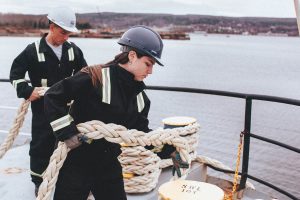Introduction

CEWIL Canada defines Work-integrated Learning as “a form of curricular experiential education that formally integrates a student’s academic studies with quality experiences within a workplace or practice setting. WIL experiences include an engaged partnership of at least: an academic institution, a host organization, and a student. WIL can occur at the course or program level and includes the development of student learning objectives and outcomes related to: employability, agency, knowledge and skill mobility and life-long learning.”
Work-integrated Learning (WIL) takes your education to new heights by seamlessly merging classroom theories with real world applications. This transformative approach empowers you to not only learn but also thrive in a practical setting.
At NSCC, WIL isn’t just a concept-it’s an opportunity for you to gain invaluable work experience that sets you apart. You’ll collaborate with seasoned industry experts and community partners, honing your skills while making meaningful contributions. This mix of classroom learning, and real-life work experience will boost your job readiness and make your education more exciting and practical.
Work-integrated Learning involves a three-way partnership between the student, employer and NSCC, and each party plays a critical role in ensuring the success of the partnership.
This guide provides you with the details you require to get ready for your work experience. At NSCC, we have five types of Work-integrated Learning experiences tailored to meet the academic outcomes of the program and prepare you for your future careers in your chosen professional or occupational fields. Depending on your program of study, you may engage in one or more types of WIL.
Field Experience
Students engage in a diverse array of work-related experiences, which may be either paid or unpaid. These field experiences are closely linked to specific courses and are mandatory for graduation. The frequency, duration and timing of your field experience(s) may differ depending on the NSCC program. All Work-integrated Learning courses are scheduled for a specific semester. The most typical field experience spans approximately 175 hours, lasting for about 5 weeks, (typically 35 hours per week), and takes place during the third semester (April-May). Consult with your faculty to determine exact length and time expectations.
Co-operative Education (Co-op)
Enabling you to “earn while you learn,” students enrolled in either a mandatory or optional Co-op course as part of your program have a unique opportunity to acquire invaluable experiences as you advance towards your second year of studies. Co-op courses are strategically scheduled between your first and second year, enabling you to apply your skills from first year, gain additional experience and skills and advance your skill development in second year. Co-op work-terms offer paid full-time (35-40 hours) employment, lasting 12-16 weeks, (420-640 hours) depending on the program. This immersive work experience enriches your educational journey and equips you with practical skills and industry insights.
Internship
NSCC offers two specialized programs, International Business and Ocean’s Technology, which incorporate a valuable and mandatory internship component. Internships are paid and occur during the final semester, lasting between 14-16 weeks of full-time employment. Internships are an important part of your studies, giving you practical experience and a chance to use your skills in real-life situations before you enter your chosen career.
Professional Practice
Unpaid work placements are mandatory for obtaining a professional license or designation in various fields, including clinical placement, practicums, preceptorships and more. These hands-on experiences provide you with practical training and the opportunity to apply your classroom knowledge in real-world settings. Such placements are essential for developing the necessary skills and competence required for a successful career in your chosen profession.
Sea Time
Allows students to apply the knowledge and skills essential for working aboard a vessel. These opportunities may be paid or unpaid, with varying durations and terms depending on the program, encompassing fall, winter, spring, or summer. Several marine programs at NSCC have sea time requirements, governed by guidelines established by Transport Canada. Sea time can be fulfilled by gaining experience on both Canadian and international merchant ships.
At NSCC, our focus is on your learning journey. The type(s) of Work-integrated Learning you are engaged with is designed with your learning needs in mind, above all else. While we aim to offer industry experiences, we understand that there may be situations where employer partners are limited. In such cases, we’ll ensure you receive an equivalent learning experience and the support you need to grow professionally.


